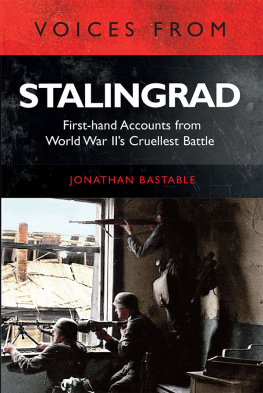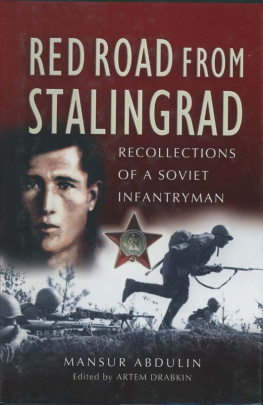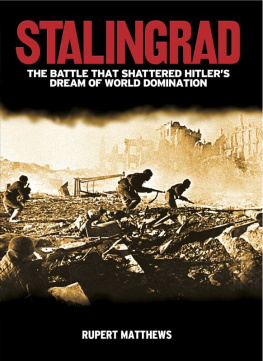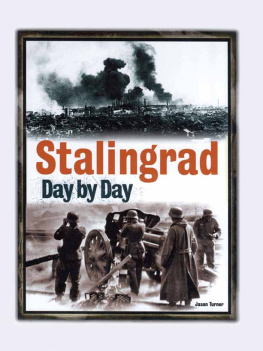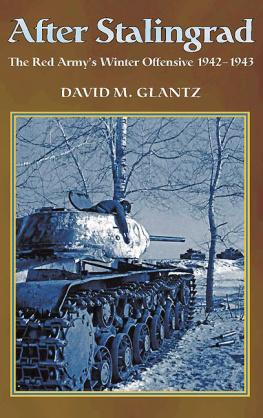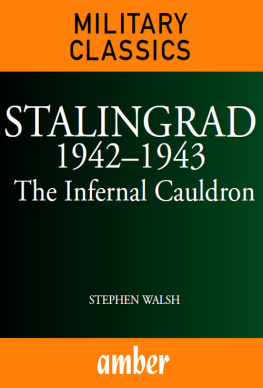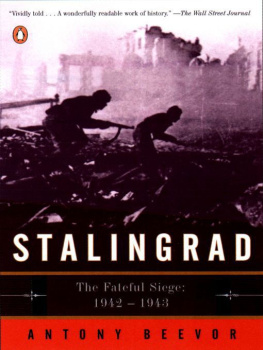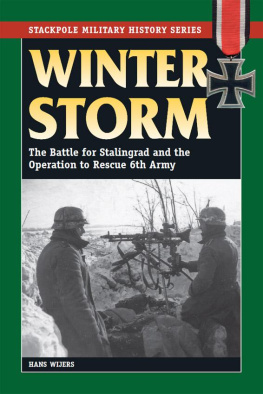Bastable Jonathan - Voices From Stalingrad
Here you can read online Bastable Jonathan - Voices From Stalingrad full text of the book (entire story) in english for free. Download pdf and epub, get meaning, cover and reviews about this ebook. year: 2019, publisher: Casemate Publishers & Book Distributors, LLC, genre: Non-fiction. Description of the work, (preface) as well as reviews are available. Best literature library LitArk.com created for fans of good reading and offers a wide selection of genres:
Romance novel
Science fiction
Adventure
Detective
Science
History
Home and family
Prose
Art
Politics
Computer
Non-fiction
Religion
Business
Children
Humor
Choose a favorite category and find really read worthwhile books. Enjoy immersion in the world of imagination, feel the emotions of the characters or learn something new for yourself, make an fascinating discovery.
- Book:Voices From Stalingrad
- Author:
- Publisher:Casemate Publishers & Book Distributors, LLC
- Genre:
- Year:2019
- Rating:3 / 5
- Favourites:Add to favourites
- Your mark:
- 60
- 1
- 2
- 3
- 4
- 5
Voices From Stalingrad: summary, description and annotation
We offer to read an annotation, description, summary or preface (depends on what the author of the book "Voices From Stalingrad" wrote himself). If you haven't found the necessary information about the book — write in the comments, we will try to find it.
Voices From Stalingrad — read online for free the complete book (whole text) full work
Below is the text of the book, divided by pages. System saving the place of the last page read, allows you to conveniently read the book "Voices From Stalingrad" online for free, without having to search again every time where you left off. Put a bookmark, and you can go to the page where you finished reading at any time.
Font size:
Interval:
Bookmark:

FIRST-HAND ACCOUNTS FROM
WORLD WAR IIS CRUELLEST BATTLE
FIRST-HAND ACCOUNTS FROM
WORLD WAR IIS CRUELLEST BATTLE
Jonathan Bastable


Voices from Stalingrad: Unique first-hand accounts of World War IIs cruellest battle
This edition first published in 2019 by Greenhill Books
c/o Pen & Sword Books Ltd,
47 Church Street, Barnsley,
S. Yorkshire, S70 2AS
www.greenhillbooks.com
ISBN: 978-1-78438-442-5
eISBN: 978-1-78438-443-2
Mobi ISBN: 978-1-78438-444-9
All rights reserved.
Main text Jonathan Bastable, David & Charles 2006, 2007, an imprint of F&W
Media International LTD, Pynes Hill, Pynes Hill Court, Exeter, Devon, EX2 5SP, UK
Original translations from Russian and German by the author, Robert Goldie and Alisa Jaffa
Publishing History
First published in the UK as Voices From Stalingrad: Nemesis on the Volga by David& Charles in hardback in 2006 and as Voices From Stalingrad: Unique first-hand accounts of World War IIs cruellest battle by David & Charles in paperback in 2007
Front and back cover images supplied courtesy of The Taylor Library
The right of Jonathan Bastable to be identified as author of this work has been asserted in accordance with Section 77 of the Copyright Designs and Patents Act 1988.
CIP data records for this title are available from the British Library
REMEMBERING STALINGRAD
Most visitors to Stalingrad - Volgograd as it is now - make the sad pilgrimage to Mamayev Kurgan. This tall hill, a Tatar burial mound, was the white-hot crucible of the battle. At the end of the war there was so much shrapnel embedded in the earth that no grass grew here, but today it is, as it was before the war, a quiet green park. It is also a war cemetery for thousands of Russian dead. A cavernous hall of remembrance has been carved out of the eastern face of the hillside. All must pass through it, filing past the eternal flame and the honour guard, on their way to view the astonishing object at the summit.
For on the crown of Mamayev Kurgan stands the colossal statue of a female figure. Rodina-Mat - Motherland - is the largest free-standing sculpture in the world. This furious giantess, 160ft (49m) tall, strains forward and holds aloft an avenging sword. She is an overpowering sight: it is as if the Statue of Liberty had leaped down from her pedestal and charged screaming into battle.
Some people find this kind of Communist monumentalism rather tasteless. But the towering Motherland figure certainly does what any work of art should: it tells a compelling and worthwhile story. It says that something of unbelievable enormity happened here, something as immense, unique and awesome as the statue itself.
But the statue does not tell the whole story. In its vastness it conveys little of the ordinary combatants experience of Stalingrad (and says nothing about the German ordeal). Those stories are compelling and worthwhile too. And the aim of this book is to give an account of the epic of Stalingrad from the standpoint of those who were there: Germans and Russians, men and women, soldiers and citizens.
The war archives in Volgograd contain thousands of accounts written by Russian servicemen. Some are barely literate, and that is why they have never been published. Other accounts have gathered dust because the writers speak of incidents in a way that would have been considered un-Soviet by the regime at the time. In recent decades, a small proportion of this material has seen the light of day, but only in Russian and in tiny print-runs.
So Russian accounts are a rich resource. But German testimony is comparatively scarce, because barely one in a hundred of the German soldiers who fought at Stalingrad came through it. Consequently, many German eyewitness stories are not after-the-event reminiscences, but extracts from letters written to loved ones during the fighting. Sackloads of these intimate documents were captured by the Russians, and a few that reached their addressees later found their way into German archives. In this book, the names of certain letter writers have been obscured at the archives request (hence, Hans S wrote ...), because the young soldiers often express Nazi views that they might have lived to regret, had they lived at all. And their objectionable opinions still have the power to distress or embarrass living relatives.
It is not just what they said; its what they did. Some of the Wehrmacbt soldiers whose voices are heard here surely committed appalling crimes in Russia. But as one reads anguished first-hand descriptions of the Germans suffering at Stalingrad, there is little way of knowing who is receiving a dose of something like poetic justice, and who is a hapless pawn caught up in Hitlers megalomanic scheme. This is not just a Nazi conundrum: though right was ultimately on the side of the Russians, Red Army men too were implacably brutal - to the enemy and to each other, and subsequently to blameless German civilians.
As I gathered voices from Stalingrad, I was often confronted by this problem of pity. How far can one sympathize with an individual, not knowing what horrors he had seen or done, or might yet do? I decided that the answer was not to judge. And I choose to pity both the misguided henchman and the wretched victim, because in this most cruel encounter, they were all too often one and the same man.
Jonathan Bastable
FROM REDBEARD TO BLUE
The war between Nazi Germany and the Soviet Union was a clash of ideologies, a tussle between empires, and a continuation of the age-old struggle between the European West and the Asiatic East. It was also a collision of two psychopathic personalities. At the nub of the war on the eastern front was the rivalry between the criminally xenophobic person of Adolf Hitler and the morbidly paranoid figure of Joseph Stalin. The battle between them took on a grandiose and fearsome life of its own at Stalingrad in 1942. It became a monster that consumed as many as two million men.
Years before he came to power, Hitler had made plans for a crusade against the barbaric Bolshevik east. It is all set out in his early autobiography Mein Kampf (My Struggle). Hitler wrote the book in 1924, while serving a prison sentence for attempting a coup in Bavaria. It consisted of a queasy mix of anti-Jewish and anti-Communist rants, self-pitying or self-aggrandizing reminiscences, and dull lectures on German politics. It was an indigestible recipe for a book, and even Hitlers closest friends and allies admitted in private that they had not been able to finish it.
But for all its ghastliness as a piece of writing, Mein Kampf does express the fullness of its authors philosophy. And with a true politicians instinct, Hitler reduces his theories to a series of easy slogans. Among the catchwords is Volk , which means The people but contains the quasi-mystical notion that the Germanic peoples represent the peak of humanitys cultural evolution, and so have a special destiny to rule over lesser nations. Then there is Lebensraum Tiving space the idea that there was not room enough in Germany for the energetic Germans, that the nation needed to expand. A third slogan is Drang nach Osten roughly the urge to the east which is the proposition that the natural annexe of Greater Germany lies in the fertile farmland of Poland and the Western Ukraine. Add to all this such martial contentions as the German people owes its existence solely to its determination to fight, and you have a programme for robbing the Slavic peoples of their ancestral territory. Once Hitler was at the helm, war with Russia was always going to happen.
Font size:
Interval:
Bookmark:
Similar books «Voices From Stalingrad»
Look at similar books to Voices From Stalingrad. We have selected literature similar in name and meaning in the hope of providing readers with more options to find new, interesting, not yet read works.
Discussion, reviews of the book Voices From Stalingrad and just readers' own opinions. Leave your comments, write what you think about the work, its meaning or the main characters. Specify what exactly you liked and what you didn't like, and why you think so.

